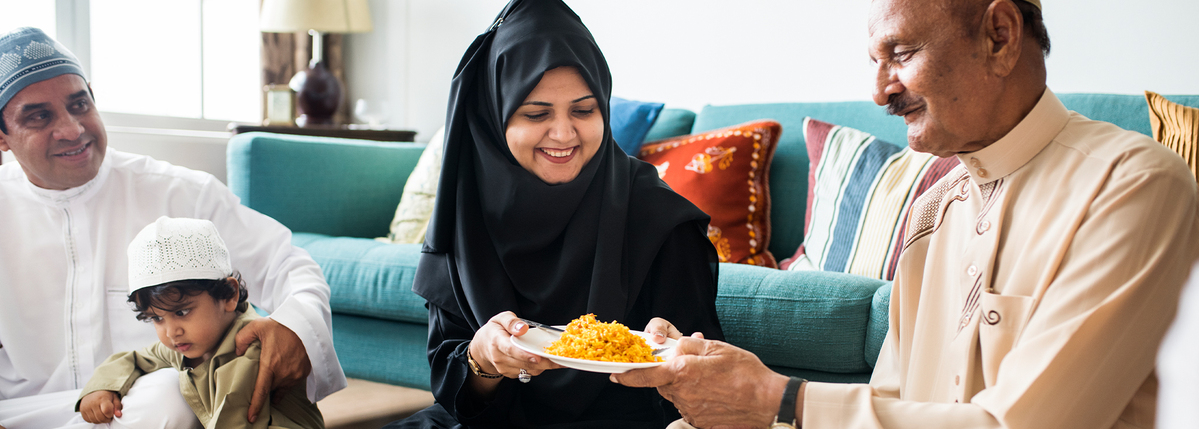Culture + Diet: The importance of tailored care
Different cultures have different definitions or perspectives of health, including varying norms around weight, food, eating and physical activity. Since so much variation across norms exists, cultural considerations can impact weight management.
Beyond Type 2 consulted Dr. Aalia Al-Barwani, an obesity medicine specialist based in Houston, who works with patients with T2D on how cultural backgrounds may impact weight management.
How does culture affect beliefs about weight management?
What is considered to be a “healthy” body type varies across cultures, with many cultures being influenced by western beauty standards.
“When I lived and practiced in the Southern US, people with [higher] BMIs were more common and people with normal BMIs were considered ‘skinny’. When I lived in the North, I noticed that physical activity was a big part of daily life. These are all things to be mindful of when putting together a treatment plan,” Dr. Al-Barwani says.
The cultural impact on body image may also affect how you feel about yourself and whether or not you believe that you need to change your body image, or if you are happy the way that you are. Cultural backgrounds can also influence whether you implement dietary changes.
Dietary changes + social interaction
One-size-fits-all dietary recommendations are seldom useful. After all, food is not just a basic necessity. Your community or family likely has foods and dishes that are both regular staples and treats enjoyed on special occasions. Lots of people enjoy cooking as a creative hobby or relaxing outlet, and associate certain recipes or flavors with nostalgia for home.
Because food is more than just nourishment, one-size-fits-all or popular diets like the Mediterranean diet, can be challenging to adopt.
When a doctor recommends a major change from you or your family’s typical diet or cooking techniques, or if it’s not compatible with your locally available ingredients or budget, it can be difficult to sustain. Yet many doctors will label people with diabetes as “non-compliant” because they fail to adapt to a nutritional plan that does not consider their cultural background.
Why do cultural considerations matter?
“In many cultures, food is an expression of love and restricting or restructuring meals can affect family dynamics,” Dr. Aalia Al-Barwani said.
There’s an emotional component to food. Prescribing an unfamiliar diet can make cooking and eating a burden. It becomes an added stress if the person looking to make dietary changes is responsible for cooking for others, or is not the primary person doing the cooking. Avoiding foods or even eating cherished dishes that feel off-limits can create feelings of stress, guilt, worry or avoidance. It may also lead to emotional or binge eating.
This isn’t a recipe for a healthy relationship with food or your weight and health.
That’s why it’s essential that healthcare providers get more personal when crafting an approach to weight management. Just like with diabetes management, the best approach is the one that works for your body and your life and feels sustainable.
It’s not surprising that many people give up on new diets when it clashes with other aspects of their lives like their culture.
Benefits of culturally tailored weight management plans
For Dr. Al-Barwani, tailoring a weight management plan to her patients’ lives and cultural background is more successful because it takes into consideration any cultural barriers to success from the patient’s perspective.
For some religious backgrounds like Jewish, Muslim, and some Orthodox faiths, eating pork can be taboo or off-limits. “If I did not take into consideration my patient’s eating preferences and provide a meal plan with pork dishes, how could I expect my patient to successfully follow the plan?” Al-Barwani said. “By asking and paying attention to these cultural and religious preferences and practices, I am communicating to the patient that I see and care about them as a whole person.”
This approach has the added benefit of strengthening the doctor-patient relationship. Not only does culturally and individually tailored healthcare make patients feel more understood, research shows that it’s an effective approach to weight management.
Studies have shown that weight loss programs that were culturally tailored to feedback from African-American women were more likely to have participants feel supported and motivated, and were more successful with achieving their weight goals. This is why it is important that providers offer culturally tailored weight management plan.
What do culturally tailored weight management plans look like?
Culturally tailored weight management plans would be a solution for many people who have struggled with previous lifestyle changes. This type of weight management plan would take things like cultural dishes and ingredients into consideration while still leading a healthy lifestyle. What does that look like?
“Integrating culturally competent care starts with recognizing that cultural differences exist and paying attention to them, and even asking questions directly to the patient about how the management plan would fit into their traditional practice and customs. Recognizing and addressing these considerations is important to improve access to care and ensure better outcomes for our patients,” Dr. Al-Barwani stated.
Just like your diabetes management is a team effort between you and your healthcare team, coming up with a culturally tailored weight management plan should also be a team discussion. If weight management is part of your diabetes care, make sure to ask your provider or nutritionist on how your plan can be tailored to your cultural needs as well.
Check out these culturally tailored resources for yourself or to share with your provider:
For people with diabetes
- Diabetes info available in different languages
- Diabetes and cultural diets
- Culturally tailored food plates
- Food, culture, and diabetes summit
- How starting a GLP-1 helped this chef address diet culture
For providers:
- Culture, language, and health literacy
- Providing oral linguistic services
- Cultural competency training and resources
- Food, culture, and diabetes in the United States
Editor’s note: Educational content related to weight management is made possible with support from Lilly Diabetes, an active partner of Beyond Type 2 at the time of publication. Editorial control rests solely on Beyond Type 2.





